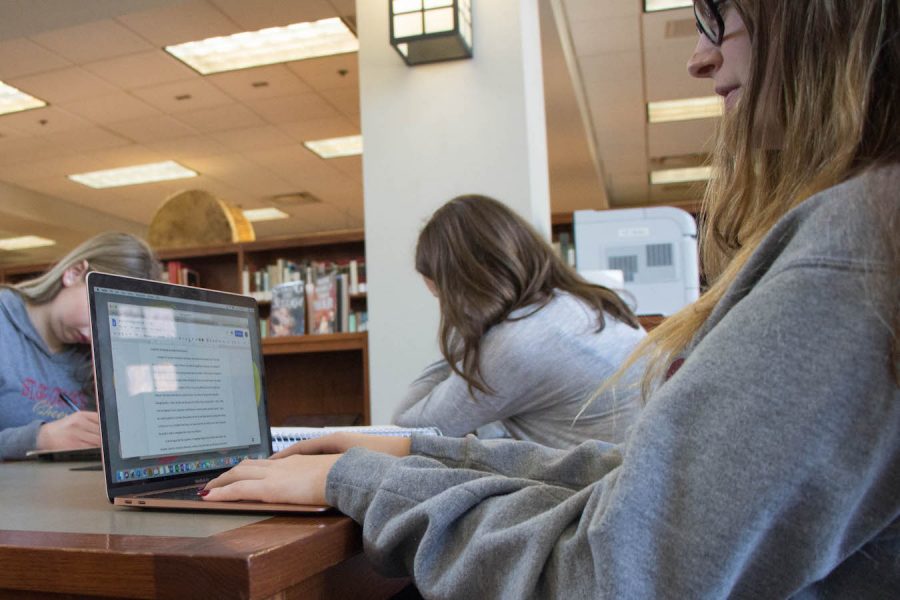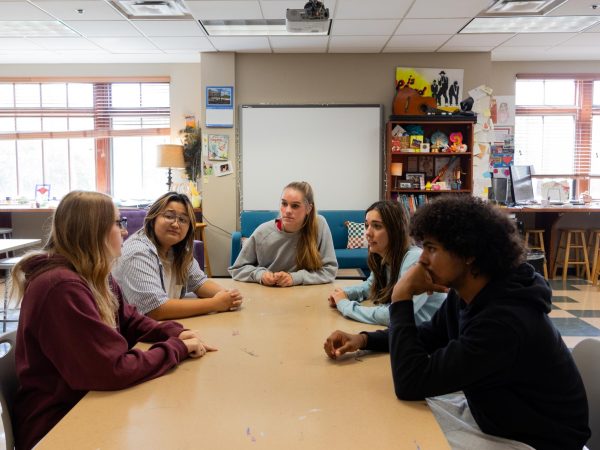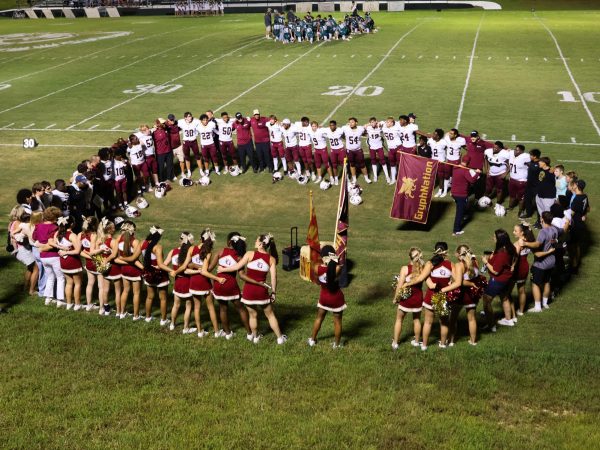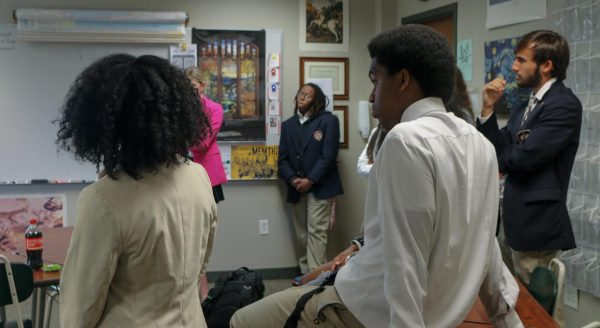Filtering Out the Distractions
Learn more about the new web filter
Photo: Cary Robbins
Junior Sarah Liebmann is working on her computer. She said that she can see the positive impact of the web filter.
“The intent of the new web filter is still about trying to figure out how to filter out inappropriate and distracting content while at school,” Technology Support Specialist Mr. Kevin Cranford said. “Like before, we don’t filter you when you leave campus. That’s not our intent.”
During this school year, the school has instituted a new web filter and a new Internet source. Mr. Cranford has been working hard to streamline these new programs, in order to ensure that the web filter is only blocking inappropriate websites.
This new web filter was put into place because St. George’s recently provided new internet access to all three campuses. Previously, all campuses were under the same Internet access, so the web filter was running through the school’s network. Now, because the campuses have different networks, the new filter is able to block inappropriate websites in all campuses since it is an application running in the background. Mr. Cranford says there are some advantages to this new web filter people may not think about, such as access to Youtube and Spotify.
“It’s a positive change because more things are unblocked like Youtube,” junior Malaisyah Vann said, “and we actually use Youtube for a lot of stuff school related.”
The old filter would not allow students to access Youtube at all if they did not have a certificate installed in their computer. This new system allows students to access certain Youtube videos that are school appropriate.
Mr. Cranford even explains that as he continues to work out some of the kinks of the new web filter, he may eventually be able to make the filter different for sixth graders and seniors. Right now, Mr. Cranford is focused on blocking out dangerous parts of the Internet.
“There’s dangerous stuff on the Internet,” Mr. Cranford said. “There’s dangers in the sense of malicious software that can hurt your computer. There’s stuff that can spy on everything that you do. But then there’s even the fact that – we got to consider that our internet has to be just as accessible to the eleven year olds in sixth grade as they are to the eighteen year olds in 12th grade. And unfortunately, 11-year-olds don’t use their common sense quite as much about certain things and dangers on the Internet. We want to protect everybody.”
Mr. Cranford even explains that there are even parts of the Internet that may have offensive messages that offend some more than others.
“While there may be content on the internet that you may not find offensive, somebody else might find it offensive,” Mr. Cranford said. “And so, if you’re sitting in a classroom looking at something that you don’t care about, but the person next to you does, that can create tension between you and your classmates that you didn’t intend to create. So, some of the offensive material, we block while on campus. It may not be to protect you, but it may be to protect the person next to you.”
Upper School History teacher Dr. Marianne Leung is excited for the new web filter because she likes the idea that it will hopefully motive more students to focus on school more when they are there to learn.
“Our students have trouble with self-discipline, and they don’t need to play games at school,” Dr. Leung said. “They don’t need to be distracted by watching certain Youtube videos over and over again. They just need to refocus and put their head in their studies, so I’m all for sensing that at school. They can do that outside of school. There’s plenty of hours outside of school.”
She understands that students get distracted when she is teaching, and she is hopeful that this web filter will reduce students’ temptations.
“If it cuts down on students getting distracted playing games and stuff, I’m 110 percent for it,” Dr. Leung said.
Students have been finding trouble going to websites because the process of unblocking websites takes a long time. However, junior Caleb Lindow says that he ran into a problem going to Wikipedia one day, but when he took his computer to Mr. Cranford, he gladly helped unblock the website.
“I feel like he does a pretty good job of blocking and unblocking stuff that needs to be,” Lindow said. “I would feel comfortable asking him, ‘Why is this blocked?’ if it’s not supposed to be, and I feel like he’s a pretty reasonable person, and he’ll listen to your case.”
Mr. Cranford encourages students to come find him if they feel strongly about unblocking a currently blocked website.
“If you think something’s blocked that shouldn’t be blocked, tell me because I don’t know,” Mr. Cranford said. “There’s billions of websites. I can’t keep up with them all. It’s impossible.”
Lindow says that he was a little skeptical of the new web filter at first because it was asking for access to all files and documents. However, he soon realized that this web filter is much more beneficial for students.
“After having used it for a month, it’s better because you can watch Youtube videos if you need to look up how to do something,” Lindow said. “You can look up educational stuff. It’s a lot easier.”
Mr. Cranford wants to stress that he is not trying to control anybody’s access to the web. Instead, he is just trying to protect students from harmful content on the Internet. With this new web filter, he is able to do that while he allows students to access more that they could not access with the old web filter.
“It sounds like we can control the student’s access more,” Mr. Cranford said, “but actually what we are doing is we’re allowing the students’ access to more content because we can fine-grain down to individual pages on a website.”













